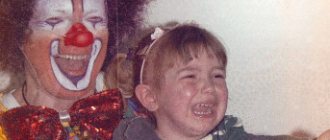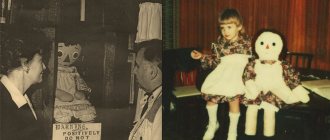What is pedophobia
Fear of children is an irrational phobia. According to one version, such fear means hidden tendencies towards pedophilia (this trait is taboo in modern society). Fear of a child transforms into the fact that a person simply avoids contact with children; he cannot stay near them for a long time. Such an individual is often suspicious of those people who have normal contact with the child.
The fear has an easy explanation. If a person commits illegal actions against minors or actions that are of a sexual nature, then they are subject to prosecution by law enforcement agencies according to the law. Such an individual receives public censure, including criminal punishment.
Fear of young children may also have other origins. Some cannot perceive a child on an equal basis with themselves, as a full-fledged person. They believe that there is no point in maintaining contact with them. Today there is a movement called childfree (such people deliberately refuse the opportunity to have children, because they believe that they interfere with a full life). Followers of this trend can rightly be called paedophobes.
The phobia does not have a serious impact on the life of an adult. The only thing a person may encounter is problems in his personal life. This situation can be solved exclusively by finding a partner with similar views. Fear of children is virtually untreatable. This requires the participation of a psychotherapist with experience.
Do these scary thoughts come true?
Common obsessive thoughts in OCD include phobias: killing or maiming, hitting someone on a vehicle, fear of harming oneself, anxiety for life, etc. People with this disease sincerely believe that their thoughts reflect their inner idea and innermost desires, and Because of this, they recognize themselves as vicious and criminal. This is wrong.
The thoughts that appear during OCD do not reflect a person’s true aspirations; they are only a manifestation of constant fear, an irrational phobia. Such fear, if it has any logical basis, is greatly exaggerated and insignificant.
The materialization of such fears is a fiction, and the disease is a reversible condition; OCD is amenable to psychological correction, that is, effective treatment.
Infertility as a form of phobia
Some people have a fear of having their own children. The most common cause of such a phobia is a person’s past, events where he acquired his own insecurity. It happens that an individual does not feel financial support and has a low social status. Some people are simply afraid to take responsibility.
If a young couple cannot decide to have children, then in this case they cannot do without the help of a psychotherapist. This phobia is rare and does not have pronounced symptoms.
In each European country, the fear of young children manifests itself differently. Parents develop fear of their own child. Married couples are afraid to become parents again.
According to recent studies, people are more likely to restrain themselves so as not to punish or scold their children. Teenagers can react violently, this causes phobia in their parents. Therefore, many simply remain silent and refuse to have children again.
For some people, the fear of young children is associated with the fear of discovering pedophilic tendencies. This is due to the ban on relationships with people of childhood, the idea of asexuality of children.
Why does a phobia occur?
There are several versions about the origin of the phobia. The first theory suggests that fear, which cannot be explained, appears in infancy. Often, when a brother or sister appears, the child develops jealous feelings. They believe that all attention will be directed exclusively to them. The older child lacks love and care. He is increasingly being sent to visit relatives for long periods of time, being evicted from his favorite room, and his personal belongings (clothes and toys) being given to the children born in the family.
The child is filled with resentment. If parents do not notice this in time, then as an adult this emotion will develop into pedophilia.
There is also the opposite theory, according to which parents are overprotective of their child. Due to excessive love, they buy him any toys, mobile devices, the best clothes, often do their homework for them, and praise them a lot and constantly. It turns out that such a child will not want his own procreation, since he will grow up to be an egoist, and when the person becomes an adult, he will continue to expect immeasurable love from his parents.
Obsessive-compulsive disorder: causes
Obsession (lat. obsessio - “siege”) is a thought or desire that constantly pops up in the mind. This thought is difficult to control or get rid of, and it causes a lot of stress.
- concerns about possible dangers (external, such as fear of being robbed, and internal, such as fear of losing control and harming someone close);
- excessive concern about precision, order, or symmetry;
- sexual thoughts or images.
- fear of contamination (from dirt, viruses, germs, body fluids, excrement or chemicals);
We recommend reading: Paid sick leave for civil servants after dismissal Almost everyone has experienced similar obsessive thoughts.
Symptoms of a phobia
If people have a fear of small children, then they believe that such a child cannot be a full-fledged individual. Those suffering from a phobia believe that children cannot be communicated on an equal basis. Parents become overprotective when they want to demonstrate in public that everything is normal in the family.
The main symptoms of pedophobia include:
- panic attacks;
- manifestation of aggression;
- inappropriate behavior;
- depressive state.
Pedophobes make a lot of effort to hide their fears from the eyes of others. As soon as they see children, they immediately try to cross to another street, immediately leave the room, and sit in another corner of the room.
Individuals suffering from a phobia may experience frequent dizziness, weakness in the body, rapid heartbeat, and sweating. They have constant problems with sleep, when fear is activated, sweating begins, fainting occurs, and blood pressure rises sharply.
Please note that if you do not fight the fear of small children, such a phobia can cause significant harm to your health. The above symptoms affect the general physical and mental condition of a person.
How to identify and treat pedophobia
Pedophobes are confident that the child has not reached the level where normal communication can be established with him. They show nihilism towards children. Parents show superficial affection towards their children and demonstratively take care of them.
The phobia does not have clear symptoms. As soon as a person is overcome by fear, panic attacks can immediately begin. To overcome the fear of small children, you need to use common sense.
A phobia has a physical manifestation:
- weak pulse;
- dizziness;
- dry mouth.
Such signs have a negative impact on the individual’s nervous system. It happens that a person may suddenly faint at the sight of a child. It is important to understand that there is no danger in children being near a pedophobe.
If fear is severe, a person cannot live normally. He needs to correct this pathology. To do this, experts advise contacting a psychotherapist or signing up for hypnotherapy sessions. The doctor will provide support and introduce you to similar people who have a fear of small children.
Tell us in more detail about psychotherapeutic and medicinal methods of treating social phobia.
The most effective and promising direction of psychotherapy in the treatment of social phobias is cognitive behavioral therapy (CBT), especially group sessions and the exposure method. The patient is gradually taught to treat previously disturbing situations without fear or anxiety. By acting in a group, participating in role-playing games and trainings, a person restores previously lost communication skills and acquires new ones, develops an adequate line of behavior in society in various situations, forms new mental attitudes based on a sense of dignity and awareness of his significance and uniqueness as an individual. For example, with assertive training, a person learns to defend his opinion, not to depend on external circumstances and assessments, to independently choose a line of behavior, control and be responsible for it. Self-respect and respect for others, the desire to reach a reasonable compromise, the ability to hear and understand another person, and also to make someone listen to oneself is the goal of such group classes. The patient also learns to control his physical responses to fear and anxiety. For example, a patient whose hands begin to tremble when communicating is asked to write on the board in a group or pour tea for everyone.
Ultimately, a person must understand his rights, which boil down to the following postulates: • I have the right to evaluate my own behavior, thoughts, feelings and I bear full responsibility for this. • I am not obliged to explain, justify or justify my behavior to anyone. • I myself decide to answer or not answer for the problems of others, and if I answer, then how deeply I go into it. • I have the right to make mistakes, illogical actions and decisions, change of views and am ready to be responsible for this. • I have the right to say: “No,” “I don’t know,” “I don’t care,” “I don’t understand you.” • I should not depend on the opinions of others and their goodwill. Of course, it is important not to overdo it, so as not to turn a social phobe into an inveterate egocentric and individualist. What is important here is a sense of proportion and the correct balance between one’s own and others’ interests. You need to be free and independent, but not ignore the interests and desires of others.
Social phobia, treatment of which by purely psychotherapeutic methods has not been sufficiently effective, can be symptomatically mitigated or eliminated with the additional use of medications aimed at eliminating symptoms of anxiety, fear and depression. These include: • Antidepressants, including SSRIs - selective serotonin reuptake inhibitors, norepinephrine and serotonin reuptake inhibitors (SRIs), and a monoamine oxidase inhibitor (MAO) called moclobemide. • Benzodiazepines (clonazepam), which may be used although effective only as a short-term treatment option due to the risk of dependence and withdrawal symptoms. In conclusion, I want to say that the sooner a person admits that he has social phobia and turns to specialists, the more effective and less radical the treatment will be, the safer the consequences for the psyche and the less significant the disruption of social ties. And this will minimize negative changes in all areas of activity of each individual patient.
Fear of children: how to get rid of it
First of all, when looking for a solution to a problem, you should seek help from a psychologist or psychotherapist who specializes in this topic. They will help you look at the situation from the other side, and together with the patient they will analyze the causes of the phobia.
Usually the pedophobe is put into a trance. This is one of the most effective methods. This way you can understand the patient’s internal attitudes and find out why the fear of small children appeared.
When a person is under hypnosis, it is easiest to identify the starting points to change the subconscious worldview. For example, this is how patients can get rid of psychological infertility. Psychotherapists also use neurolinguistic programming. This creates a positive vector of thoughts, which helps to quickly get rid of the phobia. Specialists correct a person’s mental processes and carry out a rehabilitation program (it is compiled strictly individually).
Diagnostics
The main way to determine the presence, cause and level of fear is a conversation between the child and a specialist. Using psychotherapeutic techniques and questionnaires, the doctor can identify the original source of the experience and assess the child’s current emotional state. The so-called projective techniques, when a psychologist asks children to draw or express their fear in other creative ways, have considerable diagnostic value in this regard.
In the case of real mental disorders, a standard set of examinations is carried out, including laboratory tests, EEG, MRI of the brain, consultations with a neurologist, pediatrician and other specialized specialists.
Independent ways of fighting
In order to overcome the fear of small children yourself, psychologists recommend using autogenic training. The individual must tune himself into the right mood, instill positive thoughts in himself. This is how the nervous system calms down.
You can also try meditation techniques. It is important to focus your thoughts on solving the problem. Visualization of interaction with children, pleasant time with them is allowed. You need to gradually tune in to the friendly wave.
The main meditation practices are:
- visualization
- affirmation
- breathing regulation
- muscle relaxation
When visualizing, thoughts are concentrated on children. By repeating the exercise, you can at least get rid of panic attacks at the sight of a child.
When affirming, you need to repeat the desired phrase many times. For example, a person every day repeats the thoughts that he is afraid of small children no longer lives in his heart, but on the contrary, he feels love for them, a feeling of kindness and affection. This is how thought forms are consolidated on a subconscious level, which has a positive effect on the human psyche.
Experts also note that if a phobia occurs, you should constantly regulate your breathing. For example, you can alternate between taking a deep breath and holding your breath. If you have pedophobia, hatha yoga may be suitable. This is the path to spiritual and physical improvement of a person. Proper breathing allows you to use the maximum number of muscles in the body, which subsequently relaxes them. Each cell of the body receives sufficient oxygen, and health improves.
Negative thoughts can keep not only the psyche in tension, but also its muscle tissue. To relax, you will need a set of exercises, massage and stretching. This way, excess tension is relieved, a person feels a surge of strength and energy, which allows him to achieve harmony on the physical and mental level.









